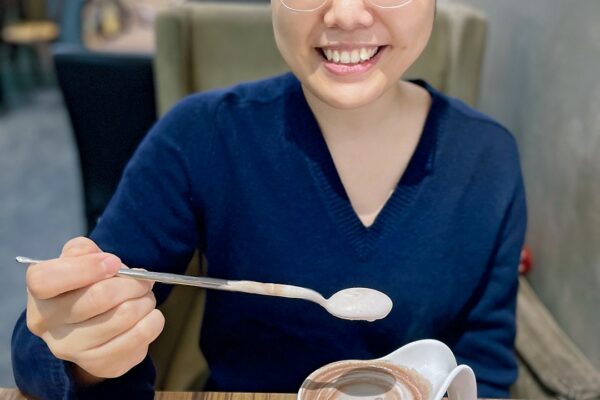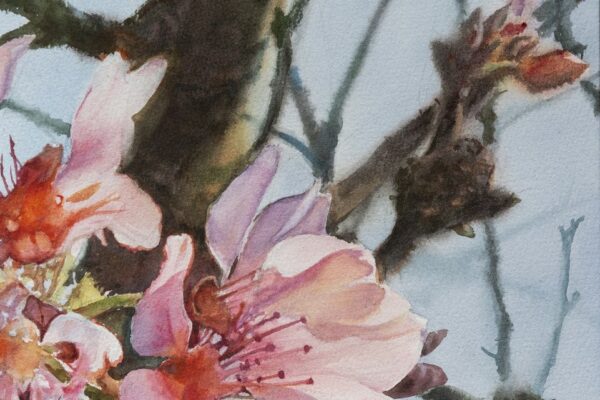By Huang Mei-yu
Edited and translated by Wu Hsiao-ting
Photos by Yan Lin-zhao
Ceasing to learn and grow speeds aging, while self-enrichment fuels confidence, joy, and energy, adding meaning to life every day. —Huang Mei-yu
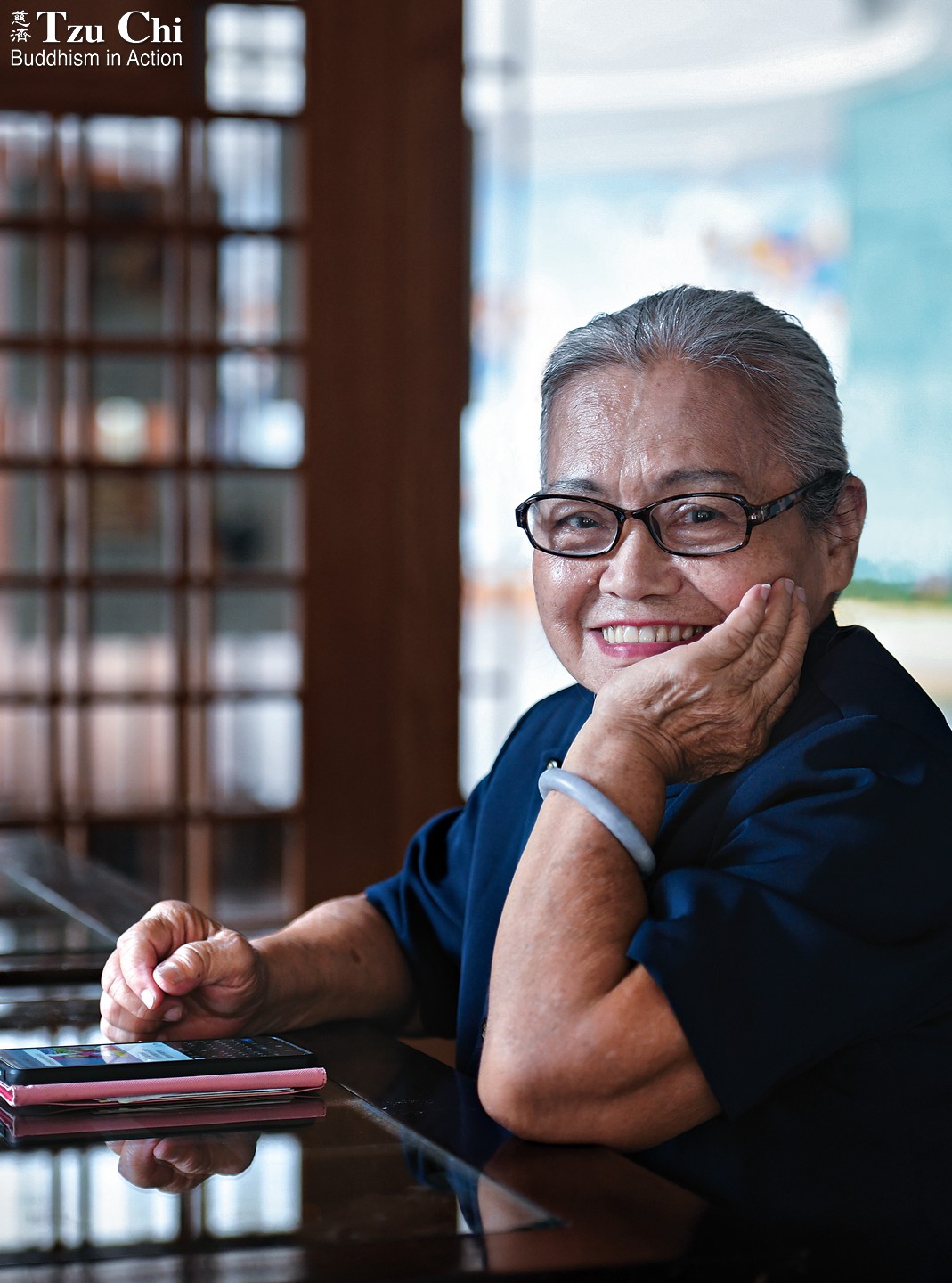
Earlier this year, Tzu Chi organized a fundraising bazaar at the Changhua Art Museum in central Taiwan to support earthquake relief efforts in Türkiye and Syria. The taiko drum team I belong to was invited to perform at the beginning of the event. Our dynamic performance elicited thunderous applause from the audience. Many fellow Tzu Chi volunteers gave me a thumbs-up, praising my performance with comments such as, “Grandma Gold, your drumming had a flawless rhythm. You were the center of attention!” and “We all admire and aspire to be like you!”
As the saying goes: “Three minutes on stage, ten years of hard work off stage.” While our performance didn’t represent a decade of practice, it demanded a tremendous amount of dedication from every team member. We learned our drumming in a taiko class. It was quite a journey, from being complete novices to performing on stage, particularly for me, 82 already. I really gave it my all!
I never miss a session of the class and always arrive early. It usually takes me several sessions to master a new drumming piece. Recognizing my age-related limitations, I wake up at 4 a.m. before each performance for intensive practice. My strength lies in putting in more effort than others, but I tend to be too hard on myself. Our teacher often reminds me to “relax and enjoy the learning process.” I keep those words in mind as I actively participate in every team activity.

Huang Mei-yu (黃美玉) practices drumming in a taiko class. She used to dye her hair a golden hue, earning the affectionate nickname “Grandma Gold.” Today, her silver-white hair makes her vitality stand out even more.
Encountering Tzu Chi
When I was in my 40s, my husband’s publishing business collapsed, followed by his untimely passing due to a stroke. He left behind a huge debt that I took upon myself. I knew I had to stay strong for my children, so I toiled day and night, willingly bearing all the burdens. The difficult days, fortunately, eventually ended in sweetness. My children grew into kind-hearted adults. Their children, my grandchildren, have brought a lot of comfort to me as well.
Despite finding solace in the warmth of my family, I faced another rough patch in my 60s. The manager of the multi-level marketing company I was part of vanished with the company’s funds, leading to its sudden closure. Our group of senior distributors was left with nothing and burdened with debt. This sudden blow deeply disheartened me. To shift my focus, my eldest daughter signed me up for a multi-media platform, allowing me access to a wider range of TV channels and National Open University courses. That was when I first started watching Tzu Chi’s Da Ai TV.
Da Ai TV offered uplifting and inspirational programs, giving me considerable nourishment and encouragement. Its prime-time dramas, based on real-life stories, especially touched a deep chord in me. I admired how the dramas steered hearts toward kindness and positivity.
I was struggling like an injured eagle during that time, weary in body and mind. Tzu Chi became the lifeline I clung to for a fresh start. My daughter had previously suggested that I become a Tzu Chi donating member, making monthly donations to the foundation, but I had politely declined. But now my perspective shifted, and I decided to take that step. When I told my daughter my decision over the phone, she was overjoyed, exclaiming, “Mom, that’s wonderful! I’ve been making donations on your behalf for many years!” I was speechless, moved by her kindness and love. Tears streamed down my cheeks.
At her encouragement, I even began training to become a certified Tzu Chi volunteer.
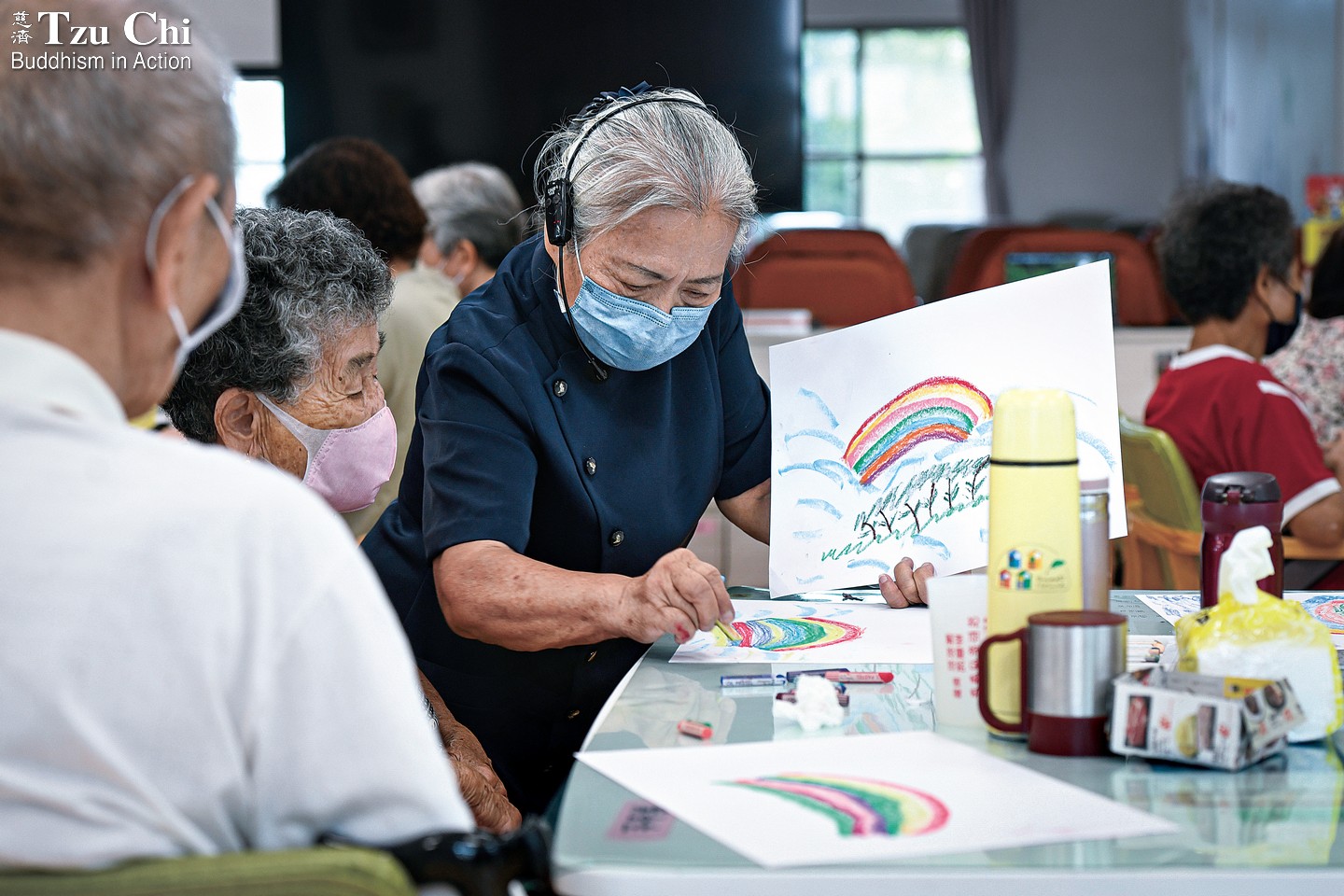
Huang teaches drawing at a senior day-care center twice a month.
A dedicated volunteer
I remember reading an article in which someone asked Dharma Master Cheng Yen, the founder of Tzu Chi, “How have you come this far on the Tzu Chi Path?” After a brief moment of contemplation, she responded, “Forbearance and humility have carried me this far.” Immediately, I was struck by a wave of emotion. I deeply admired her for establishing Tzu Chi, and I understood the challenges she must have encountered and overcome to provide relief to so many needy people around the world. In that moment, I made a solemn pledge, vowing to closely follow her and support all her endeavors.
I didn’t join Tzu Chi until I was in my 60s. Knowing there was a lot to learn about the foundation, I made an effort to attend as many classes offered by Tzu Chi as possible and learn diligently. I developed a habit of taking meticulous notes in every class.
Noticing my diligent note-taking in class, a senior volunteer approached me, saying, “I have been observing you for some time, and I noticed your consistent note-taking in class. Would you be interested in becoming a documenting volunteer, writing articles for Tzu Chi?” I was elated and immediately said yes.
But when I began writing, I noticed that my pieces lacked a certain depth. I soon realized that I needed to read more of Master Cheng Yen’s books and engage in more Tzu Chi work to write more in-depth and impactful articles.
When I first started, I didn’t know how to use a computer for writing documents. Thanks to the patient guidance of other volunteers, I gradually gained the necessary skills. They readily provided assistance over the phone, even late in the night when I was rushing to complete an article. There were even occasions when Brother Shi Long-wen (،I❊s$م) hurried to my place in the middle of the night to fix my computer, ensuring I could meet my deadline.
I went everywhere with other volunteers to cover Tzu Chi events and stories. As time went on, my writing skills improved. I also became faster, allowing me to submit drafts in the early morning after working tirelessly through the night. My efficiency even earned me the title of “Swift Pen.”
However, I wasn’t without my share of missteps in the beginning. One time, while reporting on a concert, I penned over 5,000 words, meticulously capturing every detail. My write-up was subsequently used as a cautionary example, emphasizing to newcomers the significance of focusing on key elements when documenting an event. I guess this was my 15 minutes of fame.
I have been invited several times to share my approach to crafting articles since I became a more mature writer. I always encourage my audience to participate in all kinds of Tzu Chi work to produce touching Tzu Chi-related articles. Doing so allows them to truly grasp the spirit of gratitude, respect, and love in Tzu Chi, leading to pieces that are genuinely inspiring.
Allow me to share an anecdote here. When I was about 70, a crew from Da Ai TV visited me for an interview and discovered that I typed with one finger to write my articles. The director expressed his admiration for me when he saw how I painstakingly but patiently tapped out each word with one finger. He said the dedication of Tzu Chi volunteers was just amazing.
Teaching drawing
I’m an amateur painter and teach drawing twice a month at the senior day-care center at Tzu Chi’s Changhua Jing Si Hall in central Taiwan. Though each session lasts only an hour, I enthusiastically make the journey there.
I find the elderly participants of the class very endearing. They always eagerly ask for my help with outlining, saying, “Teacher, I want to draw fruits!” “Teacher, I want to draw a house!” or “Teacher, help me create a dog!” They remind me of a group of innocent, playful children.
One of the participants referred to me as a bodhisattva, as I never fail to fulfill their requests for help. I don’t focus on my students’ artistic abilities. My main purpose isn’t to teach them how to draw but to provide warm and cheerful companionship. Given our advanced age, what truly matters is the joy we find in the act of drawing. Anything they create is worthy of praise!
My daughter Bing-xian once baked dozens of cupcakes and accompanied me to the senior day-care center to provide assistance. She was moved to tears seeing the elderly students’ affection for me. She said to me, “I knew you dedicated much of your time to Tzu Chi work, but I never fully understood the impact of your efforts until now. What a beautiful scene this is—so many elderly individuals, with limited mobility, completely engrossed in the creation of their vibrant artwork, lost in the fun of drawing.” She also shared that visiting the center helped her realize how many volunteers were silently serving the world.
I have wholeheartedly participated in various types of Tzu Chi work for more than 15 years now. It has become evident in the process that my most suitable role is to provide companionship to the elderly through art. Taiwan’s population is rapidly aging and there is a great need for initiatives or tasks dedicated to the elderly. I found myself in the right place at the right time and am more than happy to contribute to the best of my ability.
Each individual has a unique purpose; when serving in the right role, everyone can create boundless value. We might have a past we’d rather not revisit, a past chock-full of hardships. But no matter our past, Tzu Chi serves as a great platform to realize our dreams. Irrespective of our backgrounds, we can all find our place in Tzu Chi and achieve a great sense of accomplishment.
A storyteller
Recently, I received a letter:
Dear Grandma Gold:
I was a first grader ten years ago. At the time, I eagerly looked forward to your storytelling every Wednesday in our class, just like I would anticipate Santa Claus. The stories you told, illustrating the wisdom of Master Cheng Yen’s Jing Si aphorisms, were meaningful and lively, bringing us joy every Wednesday morning and making an unforgettable impression.
I am now about to finish my final year in high school. Whenever I feel down, I recall the aphorisms you shared with us, such as “Don’t underestimate yourself, as we all have unlimited potential” and “Think good thoughts, speak kind words, and do good deeds.” Those aphorisms and your stories have consistently served as a wellspring of encouragement for me.
I miss you dearly and am profoundly grateful for the precious time you dedicated to us. My heartfelt wish is for your continued well-being and enduring happiness.
With warm regards,
Jia-yun
This letter brought back fond memories from a decade ago. Back then, I regularly visited three schools every week to share stories. I can still vividly remember the children eagerly awaiting my arrival, often gathering at the windows to check if I had arrived. The entire class would burst into cheers as soon as they caught sight of me, affectionately calling out, “Grandma Gold!” It’s deeply moving to realize that some of these children, now teenagers, still remember me. Knowing that my storytelling left a lasting impact on them warms my heart to no end.
When I was in fourth grade, I often visited a classmate’s home to listen to her uncle tell stories. I didn’t have any storybooks as a child, so those storytelling sessions quickly became the highlights of my days. On one occasion, our Chinese language teacher assigned us the topic “My Aspiration” for an essay. I wrote about my dream of becoming a storyteller, convinced that sharing stories could bring joy to others. To my amazement, the teacher submitted my essay to a renowned children’s newspaper, and it was accepted for publication. I was overcome with joy when I received payment for my article. Tears of happiness coursed down my face. This experience cemented my love for imagination, storytelling, and writing.
True to my aspirations, during my middle years, I began sharing stories with homemakers in local communities. Now, with the growing prevalence of senior day-care centers in Taiwan, I frequently engage the older generation with my storytelling. With age, my life experiences have deepened, lending a more profound resonance to the stories I share.
I hold onto the hope that even at the age of 90, when I might not be as articulate as now, there will still be willing listeners for my tales.
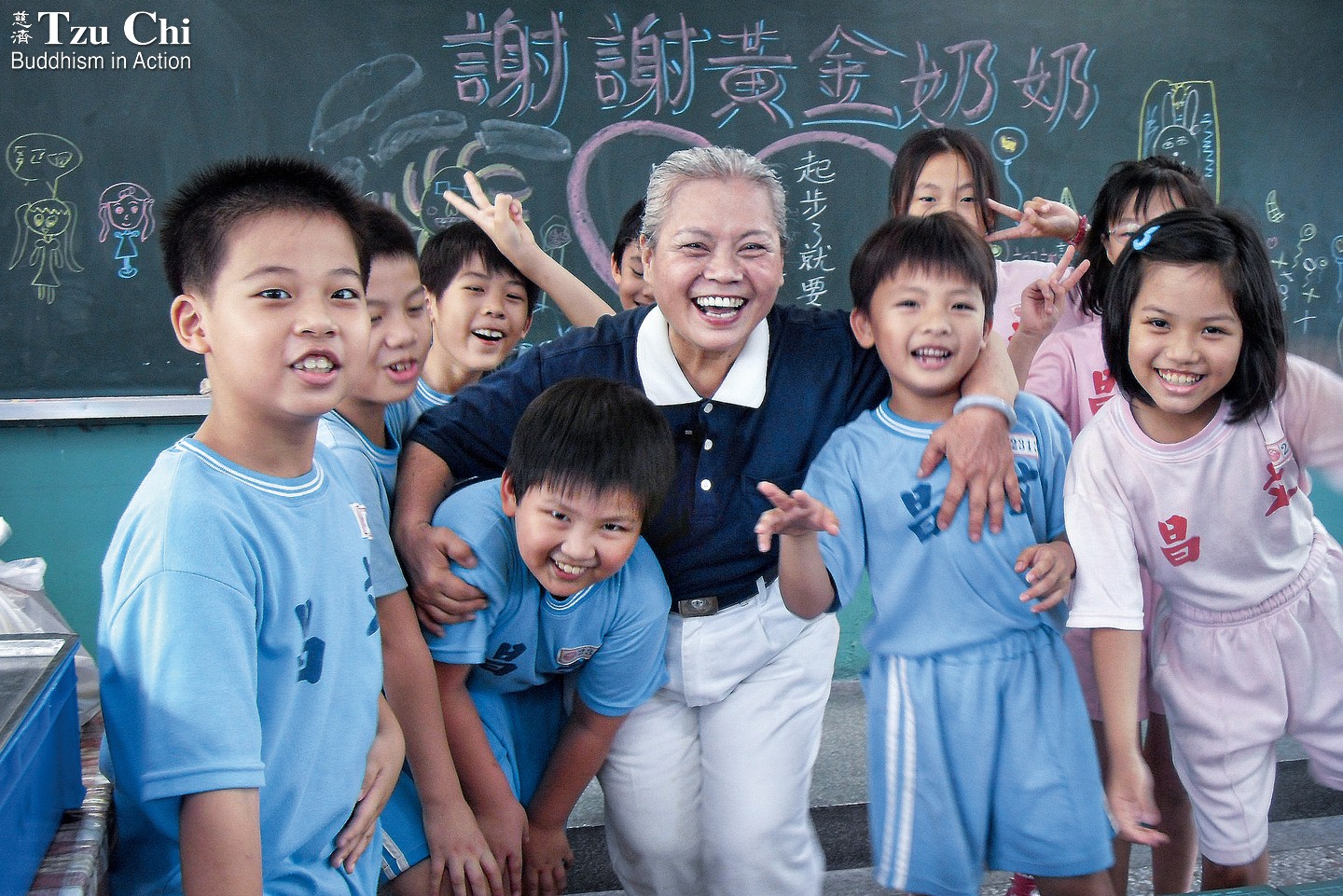
More than ten years ago, Huang regularly visited three schools to share stories and Jing Si aphorisms. Her storytelling was greatly popular with students.
Courtesy of Huang Mei-yu
Zest for learning
People often say, “You’re never too old to learn.” I have embraced this philosophy wholeheartedly. Even at the age of 82, I still possess a youthful spirit, driven by an insatiable curiosity and a passion for learning.
When I was four, my father went to work in Japan, leaving my mother and me to live with our extended family. Life was challenging, and financial constraints limited my educational opportunities. Unfortunately, I had to drop out of high school, much to my heartache. Though I had the desire to continue my studies later in life, the responsibilities of supporting my family during my midlife made it impractical. It wasn’t until my 60s, when I enrolled in National Open University, that I finally had the chance to resume my education.
Receiving my diploma from the president of National Open University and obtaining certification as a Tzu Chi volunteer marked two of the most significant milestones in my life. They served as ample compensation for the unrealized dreams I had carried since my youth.
I am now a happy, contented senior. My physical agility may have diminished, but my mind remains sharp. I often encourage people to invest in their minds, emphasizing the enduring value of mental enrichment over material possessions, like extravagant food or clothing, which offer fleeting satisfaction but lack profound fulfillment.
I lead a frugal lifestyle, finding contentment in tidy attire and simple vegetarian meals. I focus my energies on nurturing my inner self. I believe that an enriched inner self radiates an intangible glow, attracting like-minded individuals who share my enthusiasm for learning. Such people will have much to teach me and help me further enrich my life.
Learning knows no bounds. True learning transcends the mere accumulation of knowledge, extending to the cultivation of one’s character. I consider the latter to be of even greater significance than the former. I often reflect on myself, striving for personal growth. Tzu Chi’s Four-Magic Soup—contentment, gratitude, understanding, and tolerance—has provided invaluable guidance on this journey.
I have deposited 50 years of my age into the “age treasury”—a concept introduced by Master Cheng Yen, into which older people can deposit 50 years of their age, leaving them that many years younger at heart. The aim is to encourage seniors to continue giving of themselves as long as they are still able, helping them live a fulfilling and purposeful old age. I have discovered a true sense of belonging in Tzu Chi, feeling immensely blessed and secure in the embrace of Master Cheng Yen’s Great Love, an unselfish love that embraces all humanity. I am determined to make the best use of the time I have left, striving to make meaningful, impactful contributions.

